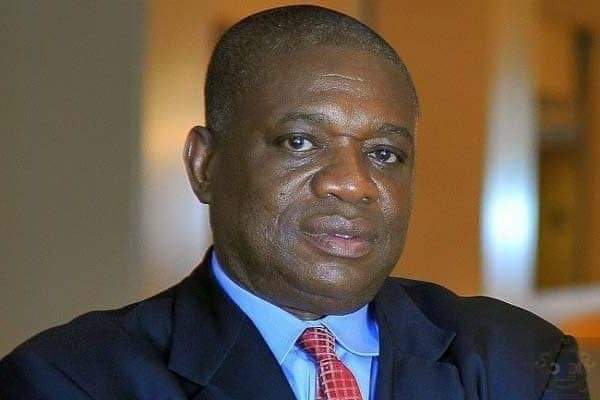On Monday the Federal Government asked the Court of Appeal in Abuja to order the fresh trial of two-term former Governor of Abia State, Senator Orji Uzor Kalu in an alleged N7.1 billion money laundering corruption charges.
The government pleaded with the appellate court to set aside the September 29, 2021 judgment of the Federal High Court, which prohibited it from retrying the former governor, and his firm, Slok Nigeria Limited over alleged N7.1 billion fraud, as void.
The Federal Government, acting through the Economic and Financial Crimes Commission (EFCC), also asked the appellate court to order Kalu and Slok to submit themselves for retrial in line with the order of the Supreme Court in its May 8, 2020 judgment voiding the earlier trial and conviction of Kalu and two others, and ordering a retrial.
The requests are contained in two notices of appeal filed by the lawyer to the EFCC, Mr Rotimi Jacobs (SAN) against the two judgments delivered by Justice Inyang Ekwo of the Federal High Court, Abuja on September 29.
Justice Ekwo had, in the judgments on applications for judicial review filed by Kalu and Slok, upheld among others, their argument that a retrial would subject them to double jeopardy having earlier been tried, convicted and sentenced on the same case.
Kalu was charged and tried with Slok and Udeogu for their alleged complicity in diverting the N7.1 billion from Abia State’s coffers.
They were convicted and while Kalu and Udeogu were imprisoned for 12 and 10 years, Slok was wound up.
But, upon an appeal by Udeogu, the Supreme Court set aside their trial and conviction in a judgment on May 8, 2020, on the grounds that the trial judge, having been elevated, ought not to have continued to hear the case.
In the judgment given in an appeal, marked: SC/62C/2019 filed by Udeogu, the Supreme Court ordered a retrial in the case.
Although Kalu and his firm were not appellants in the appeal in respect of which the Supreme Court gave its judgment, they later tendered the judgment before the Federal High Court Lagos and the court applied the judgment to them and set them free.
In the nine-ground notice of appeal filed in relation to Kalu, the EFCC argued that Justice Ekwo erred in law when he, on one hand, agreed that the earlier trial, conviction, and sentencing of Kalu was duly voided, but turned around to old that a retrial would subject the ex-governor (now a serving Senator) to double jeopardy.
It argued that the trial judge was wrong to have held “that the plea of autrefois acquit and autrefois convict (previously acquitted and previously convicted) and the principle of jeopardy availed the first respondent (Kalu) and that the re-trial of the respondent would amount to the violation of the provisions of Section 36 (9) and (10) of Constitution Federal Republic of Nigeria 1999 (as amended) and Section 238 of the Administrator of Criminal Justice Act, 2015. ”
The EFCC noted that Justice Ekwo’s decision was to the effect that the Supreme Court has declared the proceedings conducted by the Federal High Court presided over by Justice Mohammed Idris that led to Kalu’s conviction a nullity and one made without jurisdiction.
“Having found that the conviction the first respondent (Kalu) was delivered by a court without competent jurisdiction, it is absurd for the lower court to depart from the express provisions of section 36 (9) of the 1999 Constitution (as amended) and Section 238 of the ACJA, 2015 and then apply the principles of double jeopardy and autrefois convict.
“The lower court failed to consider the decisions of the Supreme Court and the Court of Appeal cited before it to the effect that the doctrine of double jeopardy or autrefois convict is only applicable to a decision delivered by a court of competent jurisdiction.”
The EFCC further faulted Justice Ekwo for making an order prohibiting the Federal Government and its agencies from retrying Kalu and his company on the same case.
“The evidence before the lower court was that the Supreme Court, in appeal No: SC.622C/2019 between Ude Jones Udeogu v. FRN had nullified the proceedings conducted by Hon. Justice M.B Idris led to the convictions and sentences of all the respondents in this appeal.
“However, it was only Ude Jones Udeogu that was the appellant. Since it was a joint trial of all the respondents, the first respondent, by his motion filed on 15th May 2020 prayed the Federal High Court presided over by Justice A. M. Liman that the proceedings that led to his conviction be nullified on the ground that Hon. Justice M.B Idris, JCA lacks jurisdiction to deliver the judgment in line with the decision of the Supreme Court.”
The EFCC also faulted the trial court for holding that Kalu could not be tried again by the Federal High Court on the grounds that the Supreme Court did not order his re-trial.
It noted that although it was based on the appeal filed by Udeogu that the Supreme Court acted it voiding the proceedings leading to their convicting and sentence, Kalu tendered the Supreme Court judgment before another judge of the Federal High Court (Justice Liman) who applied the judgment to him and ordered his release from prison on that basis of the judgment.
“The pronouncement of the Supreme Court as to the competence of the trial conducted by Hon. Justice MB Idris and the re-trial order in appeal No: SC.622C/2019 was limited to the said second respondent herein (Udeogu).
“The first respondent took advantage of the decision of the Supreme Court in appeal No: SC.622C/2019 and filed a motion before Hon. Justice A. M. Liman that since he was tried jointly with the other respondents and in view of the decision of the Supreme Court, that his conviction and sentence should also be declared a nullity.
“The lower court permitted the first respondent to rely on the decision of the Supreme Court in appeal No: SC.622C/2019 to take benefit of the order of nullity made by the Supreme Court on the judgment of Hon. Justice M. B. Idris and to avoid the burden of a retrial order made by the Supreme Court.
“The law will not permit the first respondent to approbate and reprobate at the same time,” it said.
The EFCC further faulted the trial court for holding among others that “the appellant (EFCC) was merely appealing to the sentiments for the retrial of the first respondent and that the entire proceedings in exhibit RJ3 and RJ4 have no bearing with the proceedings of the court in this case.”
It noted that while exhibit RJ3 is the motion on notice Kalu filed to set aside the proceedings conducted by Justice Idris, and exhibit RJ4 is the order by Justice Liman, made on June 30, 2020, which set aside the judgment or the proceedings conducted by Justice Idris after his elevation to the Court of Appeal.
“It was pursuant to exhibits RJ3 and RJ4 that the first respondent was released from the prison on the grounds that the judgment delivered by Hon. Justice M. B. Idris JCA was a nullity.
“It is shocking that the order of competent jurisdiction made by Hon. Justice A.M. Liman was declared by the lower court as irrelevant to the proceedings.
“There is no appeal against the decision and order of Hon. Justice A. M. Liman pending before E. I. Ekwo, J.
“Ekwo, J. sat on appeal against the order of Hon. Justice A.M Liman, setting aside the judgment delivered on the 5th December 2019 after the elevation of on Justice M. B. Idris ground of jurisdiction.
“The lower court excluded the most relevant evidence before it so as to shield the first respondent from criminal prosecution.”









